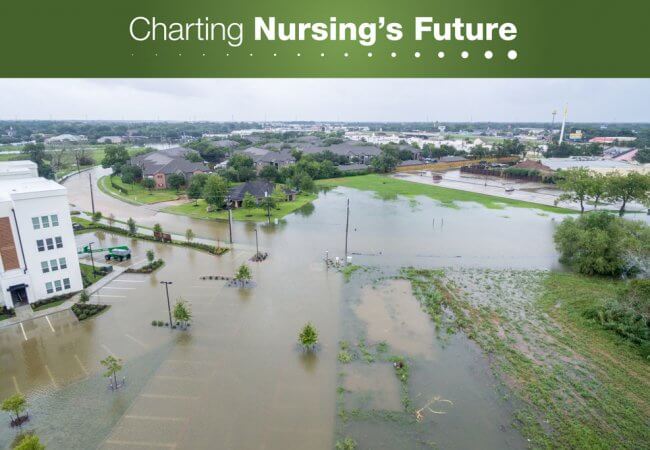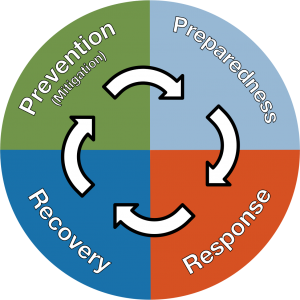
Jan 19, 2018
The Next Disaster: Are You Ready?

Nurses need to be personally prepared and know their emergency roles at work before disaster strikes.
Disasters and their aftermath follow a predictable cycle that includes prevention, preparedness, response, and recovery, yet no two disasters are exactly alike. Nurses need different skills and knowledge to respond to a hurricane, a novel infectious disease outbreak, or a mass shooting. That makes it tough for nurses—the backbone of our nation’s disaster response—to prepare for every kind of disaster, and for nursing schools to work disaster preparedness into the already packed pre-licensure curriculum. As a result, on-the-job training is key.
The Joint Commission, which accredits U.S. health care organizations, mandates that institutions such as hospitals maintain a certain degree of staff preparedness, but smaller health care settings such as nursing homes and dialysis units may lack the resources for staff training.
“In reality, it is going to take a multipronged approach if you look at the entire nursing workforce,” says Tener Goodwin Veenema, PhD, RN, FAAN, Johns Hopkins School of Nursing associate professor and an internationally recognized expert in disaster nursing and public health emergency preparedness.
Veenema hopes that, in the future, nursing schools will integrate fundamental concepts of public health and disaster preparedness into existing courses on leadership, pediatrics, geriatrics, and other topics. In the meantime, she says, “It is every nurse’s responsibility to complete some minimal educational program to understand the health impact of these events and nurses’ role in responding.”
To do that, before a disaster hits, Veenema suggests nurses:
- Take advantage of education and training within your health care organization, local Red Cross office, or state department of emergency management agency. The Centers for Disease Control and Prevention also offers online courses that teach emergency preparedness.
- Understand your role and responsibilities within your institution’s emergency response plan.
- Look for volunteer opportunities with the Red Cross, the Federal Emergency Management Agency, and National Voluntary Organizations Active In Disaster.
- Make sure you are personally prepared.
Are You Ready?
Disasters, by their nature, require that nurses respond quickly. In this video, Veenema describes four steps nurses can take to be ready to head to work during an emergency:
- Make sure you have a “go” bag with everything you will need if you are called into work for an extended stay.
- Make sure your household is stocked with food, water, and other essentials.
- Have a plan that ensures family members will be cared for and know where to meet if they are separated.
- Understand your roles and responsibilities at work during emergency situations.
Nurses who want to volunteer during disasters also need to prepare. When Hurricane Harvey struck the Gulf Coast, the Campaign showcased four ways nurses can help during a disaster, and provided links to information on what the Red Cross seeks in volunteers.

